Between the writers strike, the actors strike, the auto-workers strike, the near-UPS strike, and more, it’s been a hot union summer. Things are cooling down a bit as the governing boards of the eastern and western branches of the Writers Guild of America (WGA) voted to ratify a tentative agreement with movie and TV studios. This ends a 148-day writers strike that essentially shut down Hollywood. The members of the WGA will have to vote on the new agreement in early October, but unless something catastrophic happens, that’s pretty much a done deal. Writers can go back to work in the meantime.
The WGA let people know that it had reached an “exceptional” agreement with the studios earlier this week, but we didn’t know the details. What exactly did the writers win in this strike? Now we have more info.
What did Hollywood writers win in the strike?
Here’s a rundown of what the writers got, as laid out by the AP:
- More money. That’s why a lot of people go on strike, and this was no exception. The writers got both increases in pay and increases in earnings from residuals, which are fluctuating payments given to writers on a show or movie that rise and fall depending on how often people watch that show or movie. Residuals were a major pain point for writers, since paying them had gotten a lot murkier and more vague in the streaming era. Under the new agreement, writers get bonuses for working on streaming shows that become especially popular, which makes sense. Writers will also get increased pension and health contributions.
- Transparency. Streaming services are notoriously cagey about revealing how many people are watching their shows and movies, and for how long. Under the new agreement, the streamers must provide the WGA with those numbers, and the WGA can choose to share that information with its members. So it’s not complete and utter transparency, but it’s more that what we had before.
- Guaranteed staffing. In the streaming era, studios were increasingly employing writers for brief periods to conceive of a show, then hiring different writers to actually write the show, with the aim of employing the lot of them for as little time as possible so they could get away with paying them as little as possible. The WGA has secured protections against this practice. Writers on shows in initial development will be employed for at least 10 weeks. If a show goes to air, writers must be employed for three weeks per episode.
- Guaranteed staffing, part 2. It’s also now required that shows that run at least 13 episodes must have six writers on staff. Shows that have not yet been ordered to series must employ at least three writers, including the showrunner. According to Deadline, once a show is ordered, there’s an exception to these staffing requirements if “a single writer is engaged to write all episodes.”
- Guardrails on AI. AI has been in the news a lot this year. Could studios use it to basically replace human writers? Not under the terms of the new agreement, which stipulates that while writers are allowed to use AI in their process if certain conditions are met, they cannot be compelled to. Also, according to the agreement, “AI can’t write or rewrite literary material, and AI-generated material will not be considered source material.” Basically, there’s no danger here of robots displacing writers in the credits for shows and movies.
Those are the broad strokes; you can read the full 94-page thing if you want more detail. Basically, it sounds like the writers got everything they wanted.
Streamers team up to form new lobbying organization
And the studios sound upset about that. According to The Hollywood Reporter, studios like Netflix, Disney and Warner Bros. Discovery have formed the Streaming Innovation Alliance, a trade group designed to advocate for federal and state policies that benefit the streaming industry.
The initial statements about the new group make it sound like they want to prevent lawmakers from, say, putting in place regulations that would limit the kind of stories streamers could tell. Call me cynical, but I doubt their intentions are so noble. I suspect that, after capitulating to striking writers, studios are teaming up to lobby lawmakers to enact regulations curtailing the power of entertainment unions, and other stuff like that.
We’ll see what the future brings. For now, the writers union is triumphant. SAG-AFTRA, the actors union, remains on strike. So Hollywood is half back to life.
To stay up to date on everything fantasy, science fiction, and WiC, follow our all-encompassing Facebook page and sign up for our exclusive newsletter.
Get HBO, Starz, Showtime and MORE for FREE with a no-risk, 7-day free trial of Amazon Channels
